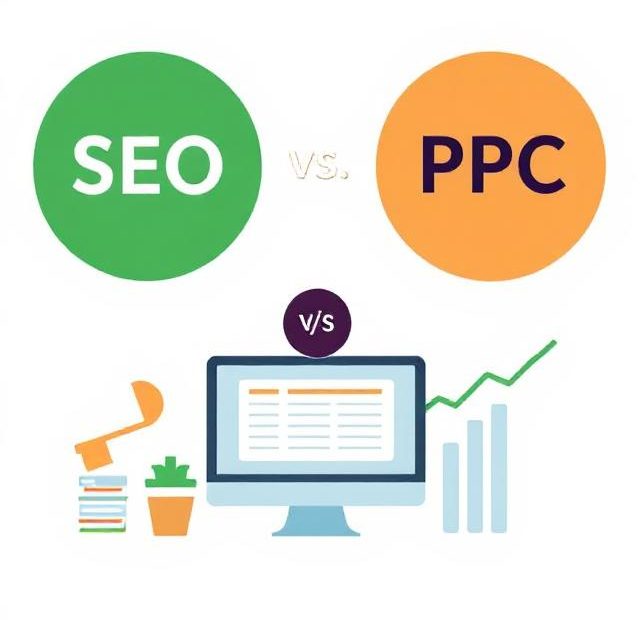When it comes to driving traffic and leads, two of the most powerful strategies are SEO (Search Engine Optimization) and PPC (Pay-Per-Click) advertising. Both are valuable tools in digital marketing, but choosing between them—or knowing how to use both—can be a tough call.
So, SEO vs PPC: which is better for your business? Let’s break down the benefits, limitations, and use cases for each to help you make the smartest decision for your growth.
What Is SEO?
SEO is the practice of optimizing your website to rank higher in organic search engine results. It involves:
-
On-page SEO (keywords, content optimization, internal linking)
-
Technical SEO (site speed, mobile-friendliness, structured data)
-
Off-page SEO (backlinks, authority building)
The goal of SEO is to improve organic visibility, which means people can find your site without you paying for clicks.
What Is PPC?
PPC (Pay-Per-Click) is a model of internet marketing where advertisers pay a fee each time their ad is clicked. Google Ads is the most well-known PPC platform, but social media platforms like Facebook and LinkedIn also offer PPC models.
You create ads, target keywords or demographics, set budgets, and your site appears at the top of search results—instantly.
Pros and Cons of SEO
✅ Pros of SEO:
-
Cost-effective long-term: Once you rank, you don’t pay per click.
-
Builds trust and credibility: Organic results are trusted more by users.
-
Sustainable traffic: SEO can generate consistent traffic over time.
-
Better ROI over time: As visibility grows, so do the returns.
❌ Cons of SEO:
-
Takes time: SEO is a long-term strategy. Results may take months.
-
Algorithm dependency: Google’s algorithm updates can affect rankings.
-
Requires continuous effort: Content, backlinks, and technical audits must be maintained.
Pros and Cons of PPC
✅ Pros of PPC:
-
Fast results: You can start generating traffic and leads immediately.
-
Highly targeted: Choose who sees your ads based on location, demographics, and behavior.
-
Measurable ROI: You can track every click, conversion, and cost.
-
Flexible budget: Scale up or down based on your ad performance.
❌ Cons of PPC:
-
Costs add up: Every click costs money, even if it doesn’t convert.
-
Short-term impact: Once you stop paying, the traffic stops.
-
Ad fatigue: Users may ignore or block ads over time.
-
Competitive bids: High competition in your niche can drive costs up.
SEO vs PPC: A Side-by-Side Comparison
| Feature | SEO | PPC |
|---|---|---|
| Speed of Results | Slow (months) | Fast (hours/days) |
| Cost | Time-intensive, no per-click fee | Pay-per-click |
| Long-Term Value | High | Low (ends when budget ends) |
| Trust Factor | High (organic = credibility) | Lower (ads can seem less genuine) |
| Control | Less control over rankings | Full control over targeting |
| Analytics | Broad (Google Search Console) | Precise, in-depth |
When to Choose SEO
Choose SEO if:
-
You’re focused on long-term growth
-
You want to build brand authority and trust
-
You have time to invest in content marketing and site optimization
-
You’re in an industry where organic traffic has high intent
Example: A law firm, blog, or local service business with long buying cycles benefits most from SEO.
When to Choose PPC
Choose PPC if:
-
You need quick results (e.g., a product launch or limited-time offer)
-
You have a defined budget for advertising
-
You want control over audience targeting
-
You need to test new markets or offers quickly
Example: Ecommerce businesses launching new products or seasonal campaigns often find PPC effective.
The Best Approach: Combine SEO and PPC
Instead of thinking in terms of SEO vs PPC, consider how the two can work together. A hybrid strategy often delivers the best ROI.
How they complement each other:
-
Use PPC for short-term wins and SEO for long-term sustainability
-
Use PPC data to find high-converting keywords, then optimize SEO for them
-
If your site is new and lacks authority, PPC fills the traffic gap while SEO ramps up
A dual approach balances cost, reach, and sustainability.
Final Thoughts
So—SEO vs PPC: which is better for your business? The answer depends on your goals, timeline, and budget.
-
For long-term brand growth and cost efficiency: SEO wins
-
For fast visibility and highly targeted reach: PPC is your tool
-
For the best of both worlds: combine them strategically
Whichever you choose, make sure to monitor performance, tweak your strategy, and focus on user intent. That’s how you drive real results.
Also, you can learn more about Digital Marketing here.
